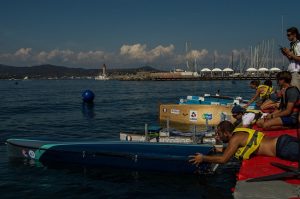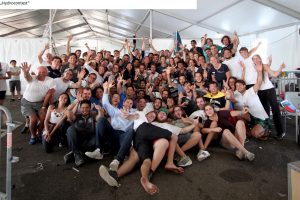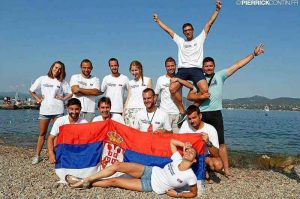The extensive budget, mobile workshops or sophisticated solutions of other teams were not enough to beat the knowledge and skills of the students of the Faculty of Mechanical Engineering, who achieved brilliant results at the international Hydrocontest, held at Saint-Tropez in September 2017. Our team participated at this prestigious competition of naval architecture students for the first time, winning the second and the third place in two disciplines. Their team spirit and the readiness to share experience and provide help to colleagues from other teams were rewarded by a special Hydrocontest spirit award. This is the award we value most, since it speaks volumes about the good impression our team left and about the way in which we presented the Faculty of Mechanical Engineering, University of Belgrade and our country, Serbia, says Đorđe Branković, the team PR and the member of the hydrodynamics team.
 Hydrocontest is a competition that gathers naval architecture students all over the world around the common issues of researching and promoting the energetic efficiency of boats. The development and construction of the boat are an important part of the task. The organisers provide each team with the 1200W electric engine. The efficiency of the boat depends on students’ skills to design and build the boat with the best hydrodynamic features. The students of the Faculty of Mechanical Engineering showed a broad set of skills and thus succeeded, once again confirming that the naval architects trained at the FME are appreciated around the world.
Hydrocontest is a competition that gathers naval architecture students all over the world around the common issues of researching and promoting the energetic efficiency of boats. The development and construction of the boat are an important part of the task. The organisers provide each team with the 1200W electric engine. The efficiency of the boat depends on students’ skills to design and build the boat with the best hydrodynamic features. The students of the Faculty of Mechanical Engineering showed a broad set of skills and thus succeeded, once again confirming that the naval architects trained at the FME are appreciated around the world.
 We knew that we had constructed good vessels, but the proof was the contest itself, says Stefan Rudaković, the leader of the Confluence Belgrade Team. Some boats had sophisticated electronic guidance, but our traditional solution proved to better and more reliable. If we bear in mind the conditions in which the students worked and the funds at their disposal, they have indeed achieved tremendous success, although we cannot say it has been unexpected, says Milan Kalajdžić, Assistant Professor at the Naval Architecture Department. Naturally, this success is based on the yearlong tradition of this Department and its high-quality teachers, who have also received numerous international awards for innovations in teaching and research. The best confirmation of the quality of the Department of Naval Architecture is the accreditation certificate issued by the Royal Institution of Naval Architects, United Kingdom (RINA).
We knew that we had constructed good vessels, but the proof was the contest itself, says Stefan Rudaković, the leader of the Confluence Belgrade Team. Some boats had sophisticated electronic guidance, but our traditional solution proved to better and more reliable. If we bear in mind the conditions in which the students worked and the funds at their disposal, they have indeed achieved tremendous success, although we cannot say it has been unexpected, says Milan Kalajdžić, Assistant Professor at the Naval Architecture Department. Naturally, this success is based on the yearlong tradition of this Department and its high-quality teachers, who have also received numerous international awards for innovations in teaching and research. The best confirmation of the quality of the Department of Naval Architecture is the accreditation certificate issued by the Royal Institution of Naval Architects, United Kingdom (RINA).
(Source: Faculty of Mechanical Engineering)

